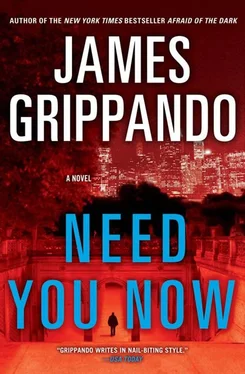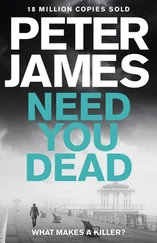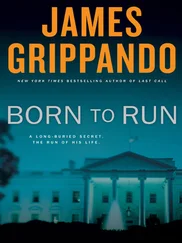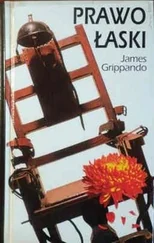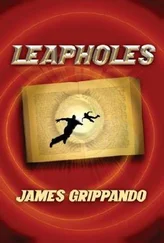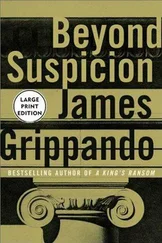“Never mind that,” said Mongoose. “You said special arrangements were made for Patrick to be at his father’s bedside. The question is, how do I get at his bedside?”
“Don’t worry, I’ll take care of that,” said Barber.
Mongoose smiled. “Still have friends in high places, eh, Joey?”
“Just get on the helicopter,” said Barber. “I said I’d take care of it.”
“One more thing,” said Mongoose, his tone very serious. “I understand that whomever you hired to take out Evan Hunt also took his computer with the encrypted Treasury memo.”
“I didn’t hire-”
“Spare me the lame denial,” said Mongoose. “I just want you to know that it doesn’t matter what you did with that computer, my safety valve is in place. Every day, your memo on Operation BAQ is automatically reset to go straight to the media at midnight, unless I manually deprogram the e-mail blast. The day I die is the day that memo launches. Is that clear?”
“Yes,” said Barber.
“Good,” said Mongoose. “Make sure it’s crystal clear to your friends in high places.”
C onnie and I drove nonstop to Boston and reached Lemuel Shattuck Hospital around nine o’clock. It was after the prison unit’s regular visitation hours, but this wasn’t a regular visit. Even so, the corrections officer at the ground-floor entrance told us that only one visitor at a time was allowed in the room.
“You go,” said Connie. “He asked for you.”
I completed the visitation paperwork, and my sister returned to the main lobby, where the Celtics game was playing on a flat-screen TV so small that Kevin Garnett looked like a Lilliputian, albeit one who could dunk. Searches were mandatory for all visitors, but in my case it was made all the more necessary by the fact that the metal detector showed no cell phone on my person, which the guard found utterly unbelievable for anyone whose work address was on Wall Street. He rode with me in the express elevator to the eighth floor, where another officer was posted at the locked entrance to the prison unit. Dr. Alice Kern met me in the waiting area, on the visitors’ side of the security doors, and introduced herself.
“How is he?” I asked.
“We had to give him something for his pain, which, of course, makes him drowsy. He’s asleep.”
“But he asked me to come because he had something to tell me.”
“Honestly, you got here much faster than I expected. You’ll have your time with him. He’ll come around in an hour or so.”
“So, his passing is not… imminent?”
“It’s not a matter of hours, no. But it could be any day. You can stay here as long as you like.” She glanced at the corrections officer, adding, “It’s been approved.”
I signed my name on the register, and the guard inside the glass booth buzzed Dr. Kern and me into the unit. I followed her down the brightly lit hallway, my heart pounding. Once the secured entrance was behind us, the prison unit looked much like any other hospital, with the exception of the corrections officers posted at each end of the corridor. There were probably a few more security cameras than in a regular hospital, but this was definitely not San Quentin. We passed several more rooms and finally stopped outside an open doorway.
“When is the last time you saw your father?” she asked.
“When I was fifteen years old.”
She arched an eyebrow. “In that case, I guess what I was about to say goes double: you should be prepared for a change in your father’s appearance.”
I had thought I was prepared, but hearing her say it made me realize that I wasn’t. “You’re right, I should be.”
“Do you want me to go in with you, or do you prefer to be alone?”
I had not yet thought about it, but the answer came quickly. “Alone.”
“That’s fine. If you need anything, you can push the red call button by the bed.”
“How much longer will you be here?” I asked.
“Don’t worry, I’ll be around.”
I thanked her, which she acknowledged with a supportive nod. Then she retreated down the long corridor, and I turned to face the dark opening to my father’s room, where he lay deep in drug-induced sleep. After one tentative step forward, I stopped, the prognosis replaying in my mind.
It could be any day.
I was suddenly wracked with guilt, my feet nailed to the floor. The last five days had been all about my father, and this was the third time since Monday that I’d tried to see him. That made for a grand total of three such attempts since my fifteenth birthday. Did that make me a lousy person? An angry young man, forever bitter that in finding his conscience, my father’s choice to turn against the mob had ended in the death of my mother? Or was I a good son who respected the courage of a father who had come to the painful realization that the only way to protect himself and his children was never to see them again? The answer was complicated, but I had no doubt that guilt was the reason I had jumped at Agent Henning’s offer to arrange for first-rate cancer treatment in exchange for six months of spying on Lilly in Singapore. I wondered if my father knew what I had done. I wondered if he would care.
I wondered, too, if guilt was the reason I felt the way I did about Lilly-that I was so desperate for something good to come out of a bad situation.
“Sir, you can’t hang out in the hallway,” the corrections officer said. I hadn’t even heard her come up behind me. “It’s not allowed. You either have to go into the room or go back to the waiting area.”
“Sorry,” I said, breathing out some of my anxiety. “I guess I’ll go in.”
B arber’s mind was on anything but charity, but he was stuck hosting a table for ten at a black-tie gala for yet another organization that had conferred “philanthropist of the year” honors on his wife and his checkbook. Vanessa lived for these events, and it annoyed her to no end when he checked his BlackBerry in the middle of one of her stories. But he might well blow his brains out if, yet again, he had to hear about Todd, “the world’s most fabiola-amazing decorator,” who had raced across Midtown, loaded up Vanessa’s Range Rover, and rescued $11,000 worth of ice sculptures that had been mistakenly delivered to the Waldorf instead of the Pierre.
Barber froze. Finally, the message he’d been waiting for: “Mr. W. will take your call now.” It was from the office of the national security advisor. He rose quickly, angry for many reasons, not the least of which was the fact that an intellectual inferior like Brett Woods had the power to make him jump.
“Excuse me, everyone,” he said to his table guests, loud enough to be heard over a twenty-piece band that was playing Gershwin.
Vanessa shot him a death ray. She hadn’t even gotten to the part where a sudden stop on Fifth Avenue had broken a swan’s neck, but “clever Todd” had just told everyone it was a stuffed turkey.
“My apologies, but this may take a while,” said Barber.
“The White House calling again, Joe?” his tennis buddy asked with a smile.
Barber forced a little laughter. “No, those days are over.”
“Please hurry back,” his wife said flatly.
Barber walked quickly through the ballroom, weaving between banquet tables, avoiding eye contact with anyone who might grab him by the sleeve and corner him for a networking opportunity. He exited to the hotel’s mezzanine level, at the end of a long row of carved oak doors, leaving the buzz of the band and the crowd behind him. A staff member directed him down the hall to a vacant room, where he could make a call in private. It was a cozy, windowless business suite with a conference table, a fireplace, and a brass chandelier. He tipped her a twenty, closed the door, and dialed Brett Woods.
Читать дальше
